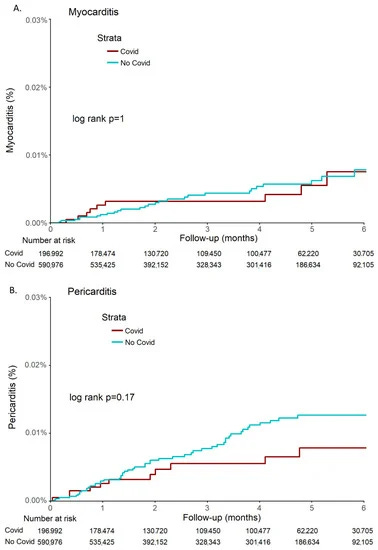New Study Confirms Heart Inflammation Spike Cannot Be Attributed to 'Long Covid'
"We did not observe an increased incidence of neither pericarditis nor myocarditis in adult patients recovering from COVID-19 infection"...
The recent surge in myocarditis and pericarditis cases, both indicative of heart inflammation, are not associated with natural Covid-19 infection, according to a new large population study published at the Journal of Clinical Medicine.
"We did not observe an increased incidence of neither pericarditis nor myocarditis in adult patients recovering from COVID-19 infection," the authors concluded.
The multi-national study was performed at Israeli universities and medical centers.
"Myocarditis and pericarditis are potential post-acute cardiac sequelae of COVID-19 infection, arising from adaptive immune responses," the researchers state in the abstract. "We aimed to study the incidence of post-acute COVID-19 myocarditis and pericarditis. The study population was a "retrospective cohort study of 196,992 adults after COVID-19 infection in Clalit Health Services members in Israel between March 2020 and January 2021."
The researchers deliberately sought to control for vaccination status in the retrospective study.
"The control cohort of 590,976 adults with at least one negative PCR and no positive PCR were age- and sex-matched," the authors added on the methodology. "Since the Israeli vaccination program was initiated on 20 December 2020, the time-period matching of the control cohort was calculated backward from 15 December 2020. Nine post-COVID-19 patients developed myocarditis (0.0046%), and eleven patients were diagnosed with pericarditis (0.0056%)."
"In the control cohort, 27 patients had myocarditis (0.0046%) and 52 had pericarditis (0.0088%)," the researchers noted. "Age (adjusted hazard ratio [aHR] 0.96, 95% confidence interval [CI]; 0.93 to 1.00) and male sex (aHR 4.42; 95% CI, 1.64 to 11.96) were associated with myocarditis. Male sex (aHR 1.93; 95% CI 1.09 to 3.41) and peripheral vascular disease (aHR 4.20; 95% CI 1.50 to 11.72) were associated with pericarditis. Post COVID-19 infection was not associated with either myocarditis (aHR 1.08; 95% CI 0.45 to 2.56) or pericarditis (aHR 0.53; 95% CI 0.25 to 1.13)."
"No statistical difference in the incidence rate of both myocarditis (p =1) and pericarditis (p =0.17) was observed between the COVID-19 cohort and the control cohort," the authors added.
"In the current large population study of subjects, who were not vaccinated against SARS-CoV-2, we observed no increase in the incidence of myocarditis or pericarditis from day 10 after positive SARS-CoV-2," the researchers stated.
"Multivariable analysis did show male sex as associated with a higher risk of developing myocarditis or pericarditis, regardless of previous COVID-19 infection," they added.
Dr. Peter McCullough reacted to the findings.
"Tuvali et al, Israel, huge study N=196K cases, N=590K controls, no excess rate of ICD-10-code identified myocarditis in unjected with natural infection," Dr. McCullough remarked. "Counters prior false claims. Can focus on mandated products as source of myocarditis at hand and move forward on management."
Dr. Mary Talley Bowden also reacted to the Israeli study.
"No increased risk of myocarditis with natural infection," she noted.
The Israeli study's findings would eliminate 'long Covid' from the list of suspected causes of heart inflammation. The researchers called for more studies to corroborate their findings.








And every other health concern associated with long COVID. The body does not continue to circulate spike protein once the viral infection has cleared. But the novel therapeutics, never before used in humans and absent any long term safety data have the ability to circulate spike proteins for at least 2 months.
Myocarditis from Covid is a myth. All part of cover for the jabs.